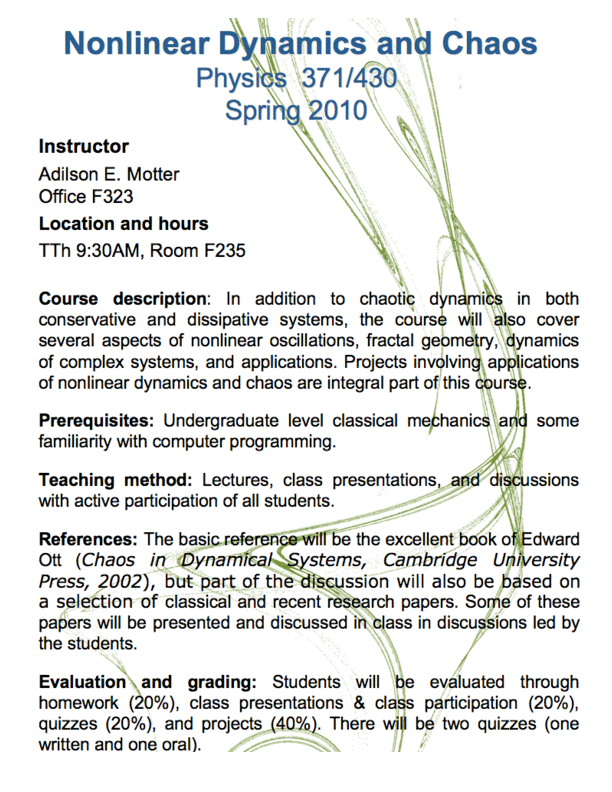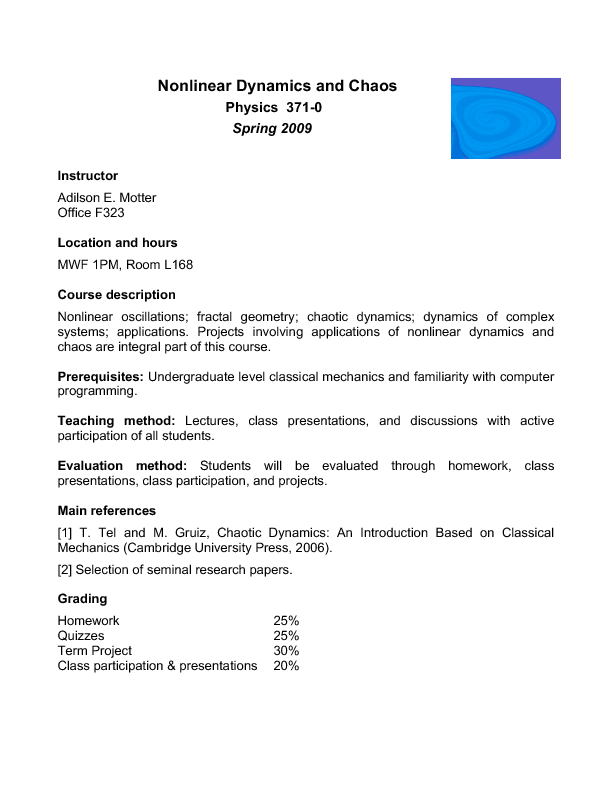Teaching
- Winter 2026: Phyx 460-0 Advanced Topics in Statistical Physics - available on Canvas
- Fall 2024: Phyx 460-0 Advanced Topics in Statistical Physics - available on Canvas
- Spring 2024: Phyx 460-0 Advanced Topics in Statistical Physics - available on Canvas
- Fall 2022: Phyx 460-0 Advanced Topics in Statistical Physics - available on Canvas
- Winter 2022: Phyx 339-1 Quantum Mechanics - available on Canvas
- Spring 2021: Phyx 339-2 Quantum Mechanics - available on Canvas
- Winter 2021: Phyx 339-1 Quantum Mechanics - available on Canvas
- Winter 2019: Phyx 103-0 Ideas of Physics - available on Canvas
- Spring 2018: Phyx 430-0/371-0 Nonlinear Dynamics and Chaos - available on Canvas
- Fall 2017: Phyx 335-0 Physics of Magic - available on Canvas
- Fall 2016: Phyx 335-0 Modern Physics for Non-Majors - available on Canvas
- Spring 2015: Phyx 339-2 Quantum Mechanics - available on Canvas
- Spring 2015: Phyx 460-0 Adv Topics in Statistical Physics - available on Canvas
- Winter 2015: Phyx 339-1 Quantum Mechanics - available on Canvas
- Winter 2014: Phyx 412-2 Quantum Mechanics - available on Canvas
- Fall 2013: Phyx 412-1 Quantum Mechanics - available on Canvas
- Spring 2013: Phyx 339-2 Quantum Mechanics - available on Canvas
- Spring 2013: Phyx 430-0/371-0 Nonlinear Dynamics and Chaos - available on Canvas
- Winter 2013: Phyx 339-1 Quantum Mechanics
- Spring 2012: Phyx 430-0/371-0 Nonlinear Dynamics and Chaos
- Fall 2011: Phyx 411-0 Classical Mechanics
- Spring 2010: Phyx 430-0/371-0 Nonlinear Dynamics and Chaos
- Winter 2010: Phyx 339-1 Quantum Mechanics
- Spring 2009: Phyx 371-0 Nonlinear Dynamics and Chaos
- Winter 2009: Phyx 411-0 Classical Mechanics
- Spring 2008: Phyx 371-0 Nonlinear Dynamics and Chaos
- Winter 2008: Phyx 339-1 Quantum Mechanics
- Spring 2007: Phyx 420-0 Statistical Physics
- Fall 2006: Phyx 465-0 Adv Topics in Nonlinear Dynamics
- Spring 2006: Phyx 420-0 Statistical Physics
Winter 2013: Phyx 339-1 Quantum Mechanics
Location and hours
Classes: MWF 10:00AM, Room L 150
Discussions: W 2:00PM, Room F 160
Office hours: W 1:00-2:00PM, Room F 323
Grader
Thomas P. Wytock (Office F 324)
Topics
- Wave function - Text book, Chapter 1
- Time-independent Schrödinger equation - Text book, Chapter 2
- Quantum mechanics formalism - Text book, Chapter 3
- Systems of identical particles - Text book, Chapter 5
- Time-independent perturbation theory - Text book, Sections 6.1-6.2
Text book
- D. J. Griffiths, Introduction to Quantum Mechanics, 2nd Edition (Pearson Prentice Hall, Upper Saddle River, NJ, 2005).
Grading
- Homework 30%
- Midterm 30%
- Final 40%
More details on Canvas.
Spring 2012: Phyx 430-0/371-0 Nonlinear Dynamics and Chaos
Location and hours
Classes: TTh 9:30AM, Room L G66
Office hours: by appointment
Topics
In addition to chaotic dynamics in both conservative and dissipative systems, the course will also cover
several aspects of nonlinear oscillations, fractal geometry, dynamics of complex systems, and applications.
Projects involving applications of nonlinear dynamics and chaos are integral part of this course.
Main references
- E. Ott, Chaos in Dynamical Systems (Cambridge Univ. Press, Cambridge, 2002).
- Selection of seminal papers.
Grading
- Homework 20%
- Class Presentations & Class Participation 20%
- Quizzes 20%
- Projects 40%
Fall 2011: Phyx 411-0 Classical Mechanics
Location and hours
Classes: MWF 9:00AM, Room L168
Office Hours: F 1:00-1:50PM, Room F 323
Topics
Review of Newtonian mechanics; variational principle; Lagrangian mechanics; constraints, symmetry and conservation laws; non-potential forces; scattering;
linear oscillations; Hamiltonian formulation; canonical transformations; Poisson brackets;
perturbation theory; and continuum dynamics.
Main reference
- H. Goldstein, C. P. Poole, and J. L. Safko, Classical Mechanics, 3rd Edition (Addison Wesley, 2002).
Grading
- Homework 30%
- Class Participation 10%
- Written Exam 1 30%
- Written Exam 2 30%

Spring 2010: Phyx 430-0/371-0 Nonlinear Dynamics and Chaos
Location and hours
Classes: TTh 9:30AM, Room F 235
Office hours: by appointment
Topics
In addition to chaotic dynamics in both conservative and dissipative systems, the course will also cover
several aspects of nonlinear oscillations, fractal geometry, dynamics of complex systems, and applications.
Projects involving applications of nonlinear dynamics and chaos are integral part of this course.
Main references
- E. Ott, Chaos in Dynamical Systems (Cambridge Univ. Press, Cambridge, 2002).
- Selection of seminal papers.
Grading
- Homework 20%
- Quizzes 20%
- Class Participation 20%
- Term Project 40%
Winter 2010: Phyx 339-1 Quantum Mechanics
Location and hours
Classes: MWF 10:00AM, Room M 120
Discussions: M 4:00PM, Room L 221
Office hours: W 1:30-2:30PM, Room F 323
Grader
Joo Sang Lee (Office F 324)
Topics
- Wave function - Text book, Chapter 1
- Time-independent Schrödinger equation - Text book, Chapter 2
- Quantum mechanics formalism - Text book, Chapter 3
- Systems of identical particles - Text book, Chapter 5
- Time-independent perturbation theory - Text book, Sections 6.1-6.2
Text book
- D. J. Griffiths, Introduction to Quantum Mechanics, 2nd Edition (Pearson Prentice Hall, Upper Saddle River, NJ, 2005).
Grading
- Homework 30%
- Midterm 30%
- Final 40%

Spring 2009: Phyx 371-0 Nonlinear Dynamics and Chaos
Location and hours
Classes: MWF 1:00PM, Room L 168
Office Hours: by appointment, Room F 323
Topics
This course is focused on nonlinear oscillations, fractal geometry, chaotic dynamics, dynamics of complex
systems, and applications. Projects involving applications of nonlinear dynamics and chaos are integral part
of the course.
Main references
- T. Tel and M. Gruiz, Chaotic Dynamics: An Introduction Based on Classical Mechanics (Cambridge University Press, 2006).
- Selection of seminal papers.
Grading
- Homework 25%
- Quizzes 25%
- Term Project 30%
- Class Participation & Presentations 20%
Winter 2009: Phyx 411-0 Classical Mechanics
Location and hours
Classes: MWF 1:00PM, Room L160
Office Hours: F 2:00-3:00PM, Room F 323
Topics
Review of Newtonian mechanics; variational principle; Lagrangian mechanics; constraints, symmetry and conservation laws; non-potential forces; scattering;
linear oscillations; Hamiltonian formulation; canonical transformations; Poisson brackets;
perturbation theory; and continuum dynamics.
Main reference
- H. Goldstein, C. P. Poole, and J. L. Safko, Classical Mechanics, 3rd Edition (Addison Wesley, 2002).
Grading
- Homework 30%
- Class Participation 10%
- Written Exam 1 30%
- Written Exam 2 30%
Spring 2008: Phyx 371-0 Nonlinear Dynamics and Chaos
Location and hours
Classes: MWF 1:00PM, Room L 158
Office Hours: M 3:30-4:30PM, Room F 323
Topics
This course is focused on nonlinear oscillators, fractals, chaos in dissipative systems, chaos in conservative systems, transient chaos, chaotic scattering, and applications.
Main reference
- T. Tel and M. Gruiz, Chaotic Dynamics: An Introduction Based on Classical Mechanics (Cambridge University Press, 2006).
- Selection of seminal papers.
Grading
- Homework 25%
- Quizzes 25%
- Class Participation 25%
- Term Project 25%
Course highlights
- G. Weil's project: Phase Space of Hamiltonian Systems
- M. Bierbaum's project: Chaotic Advection in 2D Periodic Flows
- E. Knoff's project: Quantum vs. Classical Chaos
- L. Mayr's project: Wada Fractals
- I. Bichachi's project: Demonstration of Chaotic Scattering
- M. Goss's project: Magnetic Pendulum
- Z. Nicolaou's project: Mechanical Networks
Winter 2008: Phyx 339-1 Quantum Mechanics
Location and hours
Classes: MWF 10:00AM, Room MG 28
Discussions: M 4:00PM, Room L 150
Office hours: W 1:30-2:30PM, Room F 323
Grader
Joo Sang Lee (Office F 317)
Topics
- Wave function - Text book, Chapter 1
- Time-independent Schrödinger equation - Text book, Chapter 2
- Quantum mechanics formalism - Text book, Chapter 3
- Systems of identical particles - Text book, Chapter 5
- Time-independent perturbation theory - Text book, Sections 6.1-6.2
Text book
- D. J. Griffiths, Introduction to Quantum Mechanics, 2nd Edition (Pearson Prentice Hall, Upper Saddle River, NJ, 2005).
Grading
- Homework 25%
- Written Exam 1 25%
- Written Exam 2 25%
- Final 25%
Spring 2007: Phyx 420-0 Statistical Physics
Location and hours
Classes: TTh 12:30-2:00PM, Room L 168
Office hours: W 2:00-3:00PM, Room F 323
Description of the course
This is an advanced course in statistical physics, which emphasizes on
critical phenomena, renormalization theory, and nonequilibrium phase transitions.
Additional topics will include applications to: complex systems, chaos in dynamical
systems, and processes relevant to biological physics.
Main references
- C. Garrod, Statistical Mechanics and Thermodynamics (Oxford University Press, 1995).
- L. E. Reichl, A Modern Course in Statistical Physics (Wiley, 1998).
- E. M. Lifshitz and L. D. Landau, Statistical Physics (Butterworth-Heinemann, 1984).
Reading
- H. J. Jensen, Self-organized Criticality: Emergent Complex Behavior in Physical and Biological Systems (Cambridge University Press, 2000).
- D. Sornette, Critical Phenomena in Natural Sciences: Chaos, Fractals, Self-organization and Disorder (Springer, 2004).
Grading
- Homework 30%
- Class presentations 30%
- Projects 40%
Class presentations
Self-organized criticality
Projects
- Motion inside bacterial cytoplasm
- Geometric brownian motion
- DNA inter-motif distribution
Fall 2006: Phyx 465-0 Adv Topics in Nonlinear Dynamics
Location and hours
Discussions: W 9:50AM, Room LG 62
Description of the course
Strange attractors and fractal dimensions; dynamical properties of chaotic systems; nonattracting chaotic sets; chaos in Hamiltonian systems; quantum chaos; relativistic chaos.
Main references
- E. Ott, Chaos in Dynamical Systems (Cambridge Univ. Press, Cambridge, 2002).
- Selection of recent papers.
Spring 2006: Phyx 420-0 Statistical Physics
Location and hours
Classes: MWF 1:00-2:00PM, Room M 166
Office hours: T 12:00-2:00PM, Room F 323
Description of the course
Correlation functions, measurement, and response theory.
Spontaneous symmetry breaking and phase transitions,
Landau theory of second-order phase transitions, fluctuations,
scaling theory, and critical phenomena. Additional topics will
include applications to: complex networks, chaos in dynamical
systems, and processes relevant to biological physics.
Main references
- C. Garrod, Statistical Mechanics and Thermodynamics (Oxford Univ. Press, Oxford, 1995).
- K. Huang, Statistical Mechanics (Wiley, New York, 1987).
- S.-K. Ma, Statistical Mechanics (World Scientific, Singapore, 1985).
- L. E. Reichl, A Modern Course in Statistical Physics (Wiley, New York, 1998).
Grading
- Homework 30%
- Written Exam 30%
- Projects 40%
Course highlights
- R. Dean Malmgren's project: Periodic Poisson Processes - See published results in PNAS.
- M. Hestin's project: Species Competition in Chaotic Flows
- A. Jinich's project: Correlation-based Modeling of Microbial Growth
- P. Maksym and W.-C. Huang' project: Entropy in Systems with Long-Range Interactions
- L. Mier-y-Terán-Romero's project: Networks of Reaction-Diffusion Equations
- M. Stringer's project: Correlations in Citation Networks
- X. Wu and S. L. Soh's project: Hamiltonian Systems with Typical Dynamics
